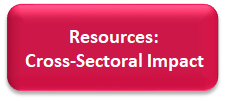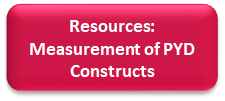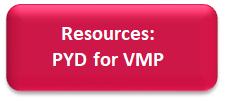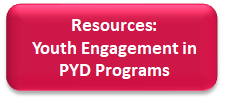Recent Learnings for Youth Engagement in PYD Programs
Across the agriculture; democracy, human rights, and governance; and health sectors, there is some strong evidence of youth engaged programs that work. Common throughout successful programs are interventions that increase youth engagement and interest in the sector, increase youth knowledge and skills, increase youth access to resources, and incorporate ongoing adult and community support and engagement with youth. Of note, none of these studies measure the level of youth engagement (i.e., high levels of engagement versus low) or propose a way to measure the extent (i.e., involvement at different program phases) of youth engagement, nor do they compare programs that engage youth to programs that do not.
Read more of what we know and what we still need to know within the key learning agenda questions:
1. What strategies are effective in enabling meaningful youth engagement?
2. What are the best ways to measure and evaluate the impact of various levels of youth engagement on intended PYD indicators and program outcomes?
Recommendations for Measurement of Youth Engagement
- Report youth engagement indicators at the youth, institutional, and enabling environment levels across programs within sectors and across sectors globally.
- Develop measures of the level of youth engagement (e.g., high versus low or consultative, collaborative, youth-led).
- Develop measures for the extent of youth engagement (e.g., involved in design, implementation, monitoring, evaluation).
- Design studies that compare youth engaged programs with non-youth engaged programs.
Global Consensus Statement: Meaningful Adolescent and Youth Engagement
This is the World Health Organization (WHO) global consensus statement on meaningful adolescent and youth engagement.
Effectiveness of Peer-led Education on Knowledge, Attitude, and Risk Behavior Practices Related to HIV Among Students at a Malaysian Public University – A Randomized Controlled Trial
This program aimed to improve knowledge and attitudes about HIV/AIDS and to reduce risk behaviors related to HIV/AIDS through a university-based, peer-led program. After three months, those students exposed to the peer-led HIV/AIDS modules showed significant improvements in knowledge, in positive attitudes towards HIV/AIDS and reductions in high-risk behaviors (e.g., condom use, safer sex decision making) compared to those non-exposed at three months.
Evaluation of a School-based HIV/AIDS Peer-led Prevention Program: The first Intervention Trial for Children of Migrant Workers in China
This peer-led HIV/AIDS prevention intervention with children of migrant workers in Shanghai at 12 junior high schools showed that after three months of peer-led education, students in the intervention group had improved knowledge, attitudes, and self-efficacy compared to the control group.
Evaluation of Three Adolescent Sexual Health Programs in Ha Noi and Khanh Hoa Province, Vietnam
This intervention involved parental and provider education as well as education sessions for adolescents. The results showed improvements in knowledge about ASRH, improved attitudes, improved self-efficacy, and improved perceived vulnerability. The results persisted one year after the intervention.
Effects of an Adolescent Sexual and Reproductive Health Intervention on Health Service Usage by Young People in Northern Ghana: A Community Randomized Trial
A program in northern Ghana tested a school-based curriculum, outreach, community mobilization, health worker training, and youth-friendly health services. Exposure to the program was associated with over twice the odds of using sexually-transmitted infection (STI) services, 89 percent greater odds of using perinatal services and 56 percent greater odds of using antenatal services.
Moderation and Mediation of an Effective HIV Risk-reduction Intervention for South African Adolescents
In South Africa, Stepping Stones aimed to improve adolescent sexual and reproductive health (ASRH) through training facilitators, a three-hour education session and community mobilization. The intervention was associated with reduced HIV prevalence in young men and women between the ages of 16-23 after two years. Among men, the intervention reduced reported intimate partner violence, casual sex, and problem drinking.
School-based Randomized Controlled Trial of an HIV/STD Risk-reduction Intervention for South African Adolescents
This study tested the efficacy of a school-based HIV/STI risk-reduction program. The findings show significant effects on the HIV/STI sexual risk behavior of young South African adolescents.
A Randomized Controlled Pilot Study of an HIV Risk-reduction Intervention for Sub-Saharan African University Students
This study tested the efficacy of an HIV risk reduction-intervention with university students in Eastern Cape, South Africa. Program participants reported less unprotected vaginal intercourse and more condom use than control groups.
Short-term Effects on Substance use of the Keepin’it REAL Pilot Prevention Program: Linguistically Adapted for Youth in Jalisco, Mexico
This substance prevention project for early adolescents was a 10-week education and skills development program implemented with early adolescents in two middle schools in Guadalajara, Mexico. Reductions in alcohol and marijuana use were found in the treatment compared to the control groups, and the intervention effects were greater for girls than for boys.
Prevention of Illicit Drug use Through a School-based Program: Results of a Longitudinal, Cluster-randomized Controlled Trial
This cluster-randomized of a life skills intervention in Taiwan examined the long-term effects of a program to reduce illicit drug use among grade 7 students. Intervention participants showed significantly lower illicit drug use compared to the control group, and they also had higher perceived behavioral control and better attitudes.
Evaluation of a Peer-led Smoking Prevention Program for Romanian Adolescents
This intervention in Romania aimed to prevent smoking in 13-14 year olds using video and peer-discussion groups to enhance self-efficacy and cigarette refusal skills. Smoking initiation in the intervention group was lower at nine months compared to the control group, and they also had negative attitudes toward smoking and increased self-efficacy.
The SHAZ! Project: Results from a Pilot Randomized Trial of a Structural Intervention to Prevent HIV Among Adolescent Women in Zimbabwe
The SHAZ! Program in Zimbabwe was a randomized controlled trial of an intervention to improve livelihoods and health for 17-19-year-old female adolescents. At two years follow-up, the intervention group had reduced food insecurity, were more likely to have their own income, were less likely to have transactional sex, were more likely to use a condom, and less likely to have an unintended pregnancy compared to the control group.
The Short-Term Impact of Inter-Community Volunteering Activities and Soft Skills Training on Self-Reported Social Cohesion Values: Quasi-Experimental Evidence from Lebanon
This study in Lebanon examined the short-term impact of a program to improve civic engagement, increase youth volunteering, and provide soft-skills training on the outcomes of social cohesion, soft-skills development, and employment. The authors found that volunteering was associated with increased perceptions of community belonging (i.e., social cohesion), but no program impact was found on employment or soft skills development (e.g., measures of leadership/teamwork, communication skills, confidence skills).
Scaling Social Accountability Evidence from Africa, Asia and the Caucasus
This publication shares evidence of the impact of social accountability after 12 years investment in research and application across 48 countries,including 15 designated as fragile contexts/states.
Examining Why and How to Engage Young People in Global Development: A Literature Review
The objective of this literature review is to assess the “why” and “how” of engaging young people in global development. In focusing on these central questions, this two-sided approach synthesizes ideas and evidence at both the theoretical and practical levels in every section of this review, and across a wide variety of youth-related issues.
Policy Communication Toolkit: Youth Leaders Module
The Youth Leaders module provides youth-led and youth-serving advocacy and accountability organizations a curriculum that meaningfully engages youth to develop their policy communication knowledge and skills. This module prepares youth to engage in policy communication as they learn about how their actions can result in strong policy creation and implementation on a range of issues. The module increases the policy communication knowledge and skills of youth leaders, equipping them with tools to improve their advocacy effectiveness and ability to engage with policymakers.
Child-Led Research: From Participating in Research to Leading It. Addressing inequalities in decision-making
This study explores how the participation of children and young people in youth-led research contribute to decision-making processes in the context of humanitarian and international development programmes.
Child-Led Research: Questioning Knowledge
This article draws upon an empirical study of ‘child-led research’ projects, undertaken in Bangladesh, Jordan and Lebanon, for a critical examination of the meanings and implications of ‘child-led research’. In particular, this paper explores what counts as knowledge in social science research within contexts of generational difference and power.
Why interventions to prevent intimate partner violence and HIV have failed young women in southern Africa
This article presents reasons for the failure of IPV/HIV interventions for young women in southern Africa. The absence of meaningful involvement of young people in designing interventions, failure to focus on broader social and structural contexts of being a young woman and not adequately considering gender norms shifts are identified major barriers which impede the success of IPV and HIV interventions.
Youth participation in HIV and sexual and reproductive health decision-making, policies, programmes: perspectives from the field
This study aims to better understand the quality of youth participation in HIV and SRH policy and programmes, including gaps, as perceived by young people. Findings from a literature review of evaluation evidence along with in-depth interviews and a global survey targeting young people with the experience of participation, indicate that there is a need for further investments in capacity building, training, inclusive participation spaces and research on meaningful youth participation.
Young People as Advocates: Your Action for Change Toolkit
This toolkit offers a step-by-step guide to help plan, implement or improve advocacy initiatives on young people’s sexual and reproductive health and rights. It can be used by young advocates, programme designers, coordinators and others who work with young people, and will be helpful to build the capacity of young advocates to promote sexual and reproductive health and rights.
The Short-Term Impact of Inter-Community Volunteering Activities and Soft Skills Training on Self-Reported Social Cohesion Values: Quasi-Experimental Evidence from Lebanon
This paper provides empirical evidence on the impact of volunteering on enhancing social cohesion values among youth in Lebanon. The results indicate that youth who were participated in inter-community volunteering activities and soft skills training were more likely to report higher and improved values of social cohesion and belonging in the short term.
African Rural Youth Engagement in Agribusiness: Achievements, Limitations, and Lessons
A literature review aiming to identify the achievements and limitations of the interventions in engaging youth in agribusiness, focusing on gaps in youths’ aspirations, access to resources, and participation in collective action.
Young people advancing sexual and reproductive health: toward a new normal
A final report of the Youth Investment, Engagement, and Leadership Development (YIELD) project focused on youth participation and leadership in adolescent and youth sexual and reproductive health and rights efforts.
Effectiveness of a youth-led early childhood care and education programme in rural Pakistan: A cluster-randomised controlled trial
An evaluation of a cluster-randomised controlled trial assessing the effectiveness of a program delivered by trained female youth aiming to support children’s school readiness. The program was effective in benefitting young children’s school readiness. The cross-generational model is a promising approach to support early child development.
Engage Youth: A Discussion Paper on Meaningful Youth Engagement
The paper details challenges preventing meaningful youth engagement and provides an overview of the core elements for meaningful youth engagement.
Youth Participation in Development - A Guide for Development Agencies and Policy Makers
A guide highlighting the importance of youth participation in development practice. It provides information on a range of promising practice for working with youth to assist organizations on how to actually work with youth at a practical operational level in policy and programming.
Advocating for Change for Adolescents-A Practical Toolkit for Young People to Advocate for Improved Adolescent Health and Well-being
The purpose of this toolkit is to guide the design, implementation and monitoring of an effective national advocacy action roadmap to bring about positive policy-specific changes to improve the health and well-being of adolescents.
Intentional Youth Engagement in the Passages Project
Passages is a five-year (2015-2020) USAID-funded project that aims to address a broad range of social norms, at scale, to achieve sustained improvements in family planning and reproductive health. (2018)
Drama for Conflict Transformation Toolkit: Youth Theater for Peace
This toolkit is designed to introduce young people to an innovative theater methodology that creatively examines and transforms conflict. After working through the exercises in this manual, youth will be equipped to lead community dialogue as agents of positive change.
Proyecto Acción Transformadora
Proyecto Acción Transformadora develops representative cohorts of promising future political leaders with the capacity to address some of the country’s most pressing challenges. The program targets youth ages 16-35 to activate potential leaders, strengthen and mobilize developing leaders, and support leaders in action as they catalyze change within the country’s most marginalized communities.
Youth Development Competencies Program Evaluation
Program evaluation report of the Youth Development Competencies Program (YDCP) works to empower Russian youth and develop their competencies to succeed and contribute as professionals and citizens by facilitating the replication and expansion of programs in line with the best practices in positive youth development (PYD). (2011)











